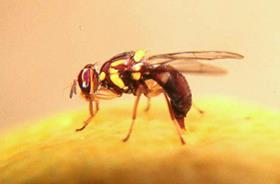
New Zealand’s Ministry for Primary Industries (MPI) says the country’s biosecurity system has responded well to record numbers of international visitors this summer.
MPI staff screened 684,407 air passengers for biosecurity risk in January, an increase of more than 10 per cent from January 2016. They intercepted some 12,600 biosecurity risk items over this period, with over 14 per cent of these items undeclared.
A suitcase from Malaysia filled with mangos containing fruit fly larvae was among the items seized at Auckland Airport.
“The interceptions show New Zealand's biosecurity system is holding up well in the face of huge numbers of arriving passengers, many of whom have little knowledge of biosecurity,' said Craig Hughes, MPI's manager north passenger and mail.
MPI has invested in bolstering it operations over recent month, including the employment of nearly 30 new quarantine officers.
'Most of the new staff have been working on the search benches at Auckland Airport to check the baggage of passengers identified as high risk,” Hughes explained.
'We've also introduced more staff to make biosecurity risk assessments of passengers at the airport. This, coupled with recent layout changes and a new x-ray machine for screening baggage, has allowed speedier processing and improved biosecurity.'



